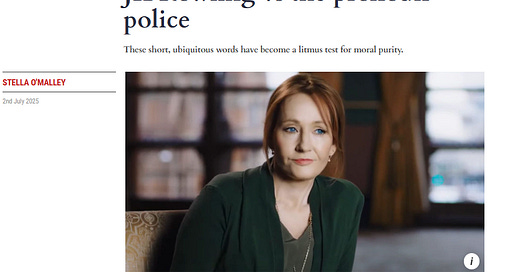We’re long past the days when ‘he’ and ‘she’ were just neutral tools of grammar. Today, pronouns are loaded with ideology — wielded as moral tests, tribal markers, and passive-aggressive demands for loyalty. It’s absurd. And yet, it’s also deadly serious.
My latest piece about pronouns was published by Spiked last week:
👉 JK Rowling vs the Pronoun Police
This post is not a recap, but an extension of the discussion.
Because what’s really happening in the pronoun wars is more than just semantic confusion. It’s a linguistic battleground where the rules of reality are being rewritten.
Take J.K. Rowling, who simply pointed out the obvious in response to Ben Ryan’s post about pronouns: that forcing women to call a man a woman isn’t kindness — it’s coercion. This debate isn’t about politeness; it’s about power. Yet people still talk about it as if it were sex-neutral. It isn’t. The impact of calling a man a woman is not the same as calling a woman a man. There’s a clear asymmetry — one rooted in sex-based reality. But when the topic turns to pronouns, conversations about sex discrimination and inequality are strangely absent.
Pronouns are now treated like talismans of virtue. Use them “correctly” and you earn moral standing within your tribe. Use them “incorrectly” — or decline to use them at all — and you risk social exclusion. That’s the role they play today. They’re no longer just words; they’ve become a test of ideological compliance.
What has been smuggled into public life under the banner of compassion and politeness is, in fact, something far more troubling. A growing expectation now exists that individuals publicly affirm beliefs they may not hold. This is not about courtesy or inclusion — it is compelled speech.
I’ve spent years working with people who were once caught up in gender identity confusion and have since detransitioned. Many continue to use their adopted pronouns — not because they believe in them, but because they feel trapped by their altered appearance. Medical transition has changed their bodies and faces, leaving them stuck in forms that no longer reflect who they are. For biological females, this often means being perceived as transwomen — that is, men who identify as women. These women avoid using female bathrooms not because they doubt their own identity, but because they fear confrontation. They want to avoid the drama, the stares, and the possibility of being challenged in public.
Language, in this climate, is fast becoming a tribal marker of political allegiance rather than a means of honest communication.
Keep reading with a 7-day free trial
Subscribe to Stella O'Malley to keep reading this post and get 7 days of free access to the full post archives.






